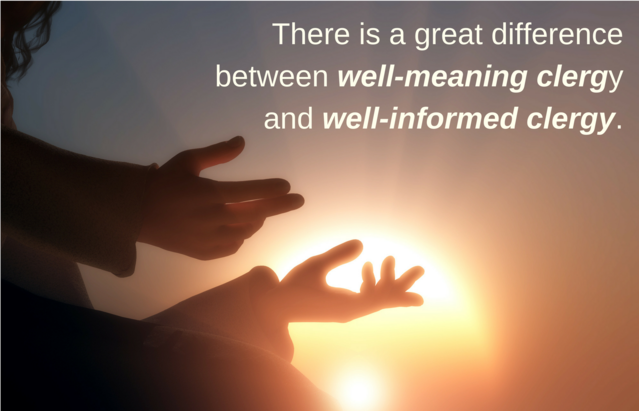

In Part 1 of this series, I discussed the troubling issue of clergy abuse and the toll it takes on victims. As a society we must continue to advocate that clergy are held accountable for their actions — rather than giving them a slap on the wrist or hiding and protecting perpetrators by relocating them to another parish or synagogue. I applaud the brave films and documentaries that are committed to shedding light on abuse that occurred in the 60’s and 70’s. However, we can’t lose sight of the fact that this kind of abuse and betrayal continues to occur today as well. Educating the public about this reality is key: proactively fighting to increase prevention and respond with full force is the only way we can truly work to eradicate the problem and bring genuine healing to victims.
I also identified the very real problem of the mishandling of disclosures by clergy. All too often after victims summon the courage to confidentially share their traumatic experiences with clergy there is no follow through or intervention. I believe this is because clergy are not mandated reporters and truly don’t know what to do the potent information they’ve been given. It’s unfortunate that many, if not most, Rabbis, Priests, and Imams are typically bereft of psychological training, despite the fact that they are often confronted with congregants’ emotional and psychological struggles. In order for true change to occur on a systemic level we must educate and empower clergy to do the right thing when faced with a disclosure of abuse. With guidance and collaboration with mental health professionals, clergy can play an important and reparative role in getting victims the treatment and legal recourse they deserve.
There is a great difference between well-meaning clergy and well-informed clergy. Well-meaning clergy often believe that helping victims to not rock the boat is in their best interest. Speaking out about their abusive experiences might “shame them, their families and their religious communities.” It might “make it more difficult for them to find a partner and marry if they self-identify as a sexual abuse survivor.” It might “threaten the financial security of the family system if the bread-winning perpetrator goes to jail, or impact the reputation of siblings.” The process of reporting might “exacerbate the emotional aspects of their trauma.” These are all well intended concerns but only serve to promote rationalization, denial, and the invalidation of the victim’s pain.
I believe it behooves clergy to do the following:
- Learn about the impact of trauma through mental health journals, textbooks, or attendance at conferences and workshops.
- Use the pulpit to talk openly about trauma, to educate congregants, and encourage disclosures.
- Commit to reporting or helping victims to self-report whenever abuse is disclosed.
- Have mental health resources readily at their disposal for both consultation and referral.
- Use their religious credibility to undo the propaganda that abusive clergy use to justify sexual abuse by weaving in religious rituals or liturgy.
- Recognize the role that spirituality can play in a victim’s healing process and offer safe, respectful ways for survivors to reconnect with this resource for comfort.
- Commit to heightening safety for children in synagogue and church settings by making sure no adult is allowed to be in an unsupervised space with a child.
- Establish a response policy when it is revealed that a congregant has been accused and found guilty of abuse.
Please share your thoughts regarding the positive role that clergy can play in helping survivors to heal.
Missed Part 1 of this series? Find it here.

